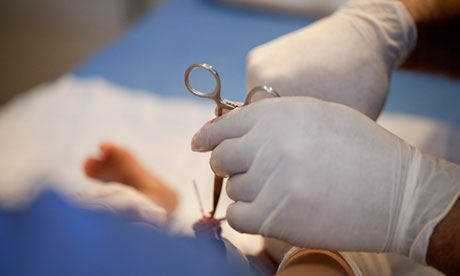
In a matter of weeks, I am to become a father for the first time, to a boy. I'm nervous as hell and will be counting the toes and fingers of the little blighter as soon as he arrives, hopeful that he emerges as billions of years of evolutionary fine-tuning has determined – in other words, perfect.
One thing I certainly will not be doing is allowing someone to needlessly remove a part of him.
Nor am I prepared to have one of his first experiences in this world be the pain of a surgical operation that will leave him with a wound that will take time to heal, carries risk of infection and could potentially impact on his sexual enjoyment as an adult: circumcision.
Of all the decisions that new parents' face, it is the one that I and my wife have probably spent the least amount of time on. The colour of the nursery took three trips to the hardware store. Whether to go for the deluxe or standard version of a popular Swedish-inspired baby-carrier: about two days. The lad's name has yet to be agreed upon, despite months of agonising over it.
But whether to have a physician – or even worse, someone not medically certified – lop off a part of my child without it being truly necessary? Nope, not going to happen.
Medical practitioners I have spoken to on the subject – including friends and our current obstetric gynaecologist (OB-GYN) – all agree. Which is why the decision by the American Academy of Pediatrics (AAP) to issue new guidelines suggesting that the "health benefits of newborn male circumcision outweigh the risks" has come a bit out of the blue. I had been led to believe that medical community had been moving away from such beliefs. German courts have tried to ban the practice, and in the US, the number of baby boys subjected to the snip has been falling for years.
Could I, my wife, our OB-GYN and doctor friends all be wrong?
A further reading of the AAP guidelines put my mind somewhat at rest. The research behind the latest guidelines is selective at best, drawing heavily upon studies of adult men in Africa. It also didn't provide me with anything new: I already knew that studies of adult men in Africa had found that circumcision can cut the chance of a heterosexual male contracting HIV.
But I've also seen that other studies have shown it does little to improve the chances of non-infection during gay sex. Furthermore, for women, sex with circumcised men may even increase the risk, clinical trials have found.
I can't know if my child will be straight of gay, or if he will be living in Africa or elsewhere when he is of an age to have sex. But I do know that I'm not going to rely on the removal of his foreskin instead of educating him about safe sex. I'm advocating "condoms, condoms, condoms" as soon as the boy is old enough to be embarrassed by his old man talking to him about sex.
Time and again, condoms have been scientifically proven as a better way to reduce the risk of infection. In contrast, some studies have suggested that circumcision, and the belief that it lowers the risk of STDs, could see a drop in condom use.
I'm happy to be guided by science and medicine on the matter. I just wish the AAP could be as rigorously focused – for the medical body doesn't appear to be guided by medical opinion alone. Its new guidelines include the recommendation that "parents should weigh the health benefits and risks in light of their own religious, cultural and personal preferences."
Say again? So the adult gets to choose which part of an unconsenting infant should come under the knife based on his of her "preferences". Would the AAP also make the same concession to cultural traditions with regard to female circumcision – a barbaric practice that ranges from a nick of the clitoral hood to the whole-scale removal of the clitoris, as well as the inner and outer labia.
Let me be clear: I am in no way equating that horrific procedure, which continues to inflict untold harm on girls across parts of Africa and the Middle East, with male circumcision. But it should be noted that the justification by those who do practice female genital mutilation use much the same language as those who defend male circumcision – the latter including now, apparently, the AAP. Has this "circumcision taskforce" been swayed by deference to religious beliefs, rather than the clinical evidence?
As an expectant father, I simply want what is best for my child. Of course, it would be my preference that he be a jazz-loving, Guardian-reading, Watford FC supporter, but those things are not mine to command; they are decisions for him to make in his own time. And I believe in extending him the same courtesy to his physical integrity, over his penis. At no point do notions of culture or tradition or personal preference come into it.
Down the years, there have been many traditional cultural and medical practices that have been debunked and rightfully thrown out. But if I, along with the medical practitioner tasked with bringing our son into the world, together with a growing proportion of the world's scientific community – aside from the AAP, of course – are wrong, then as a consenting adult, he can decide whether to have the snip. Unfortunately, for those who have had the decision taken away from them as infants for reasons of culture, religion or misguided notion of public health policy, no such option is available.

